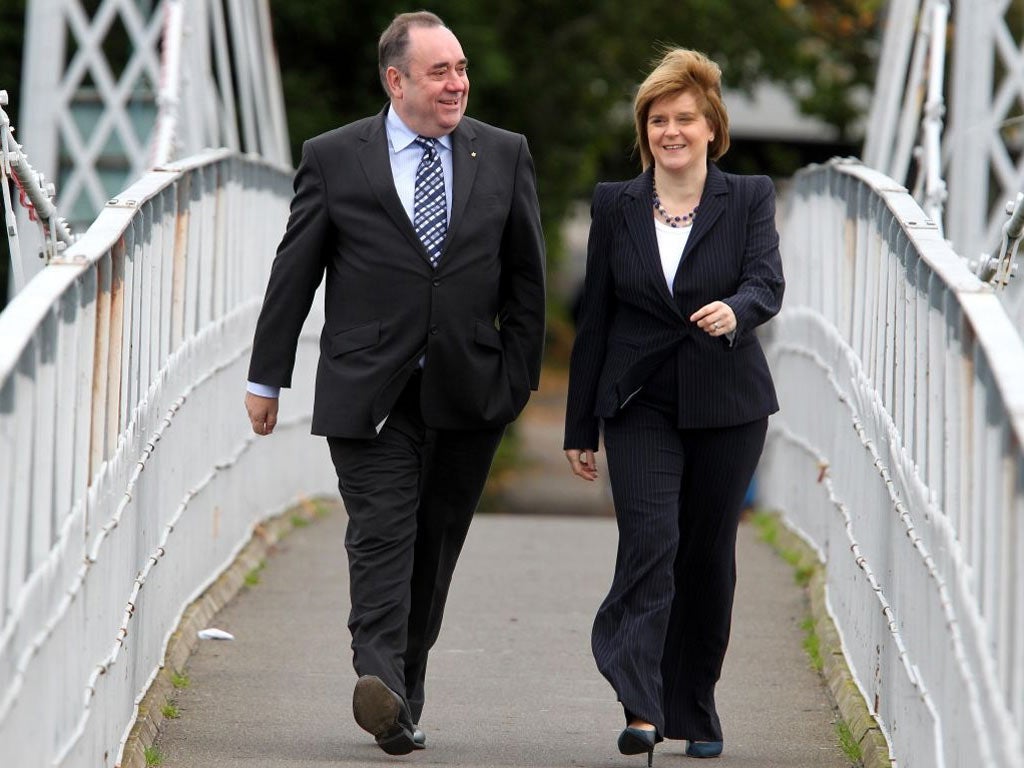Salmond's secret plan to win Scottish independence
SNP leader wants a referendum to consider three options, including 'devolution max'

Scottish Nationalist Party (SNP) activists convening in Inverness for their annual conference are aware they are closer to their goal of Scottish independence than ever before – what they don't know is what sort of independence it is.
Ever since the SNP won this year's Scottish Parliament elections, opinion polls have shown the gap narrowing between independence and support for the union. Some have even put independence ahead.
However, there is another aspect to this agenda which is emerging as a new – and potentially more likely – route forward: "independence lite". Alex Salmond wants to put three options to the Scottish people in the referendum: independence, the status quo and independence lite.
This has been seen by many as a calculating move, designed to ensure the SNP leadership achieves something substantial from the referendum if it fails to get outright independence. It is expected to appeal to the many Scots who want more autonomy and have sympathy with the SNP, but baulk at full independence.
It is also attracting support across the political spectrum. Henry McLeish, the former Labour First Minister, has urged Labour to consider endorsing independence lite – or "devolution max" as unionists like to call it.
Mr McLeish said: "We have to look at the referendum and that doesn't mean just opposing it but putting forward our own positive vision, and for me that could be 'devolution max'."
The policy would mean the complete handover of all financial powers from Westminster to Holyrood. Scotland would raise all of its taxes and then pass a portion of them to the UK Treasury to pay for Scotland's share of diplomatic missions, the Royal Family and defence. Everything else would be run by Scotland in Scotland, giving the country independence in all but name.
This "third way" would change the nature of UK politics dramatically – if only because it would remove all Scottish MPs from the House of Commons, leaving some sitting in a confederate second chamber. Labour leaders in London are well aware of the damage that the loss of Scotland's battalion of 41 Labour MPs would do to their chances of regaining overall power, which is one of the reasons why the party has not taken a definitive position on the issue.
However, the idea of endorsing something positive – rather than just resisting Mr Salmond's vision for Scotland with negative messages – does appeal to some Scottish Labour MPs.
Eric Joyce, the Labour MP for Falkirk, said: "Campaigning for devolution max would make eminent sense and I like to think Labour would be behind it."
The main difficulty for Labour and the other unionist parties is that no-one knows exactly what an "independence lite" Scotland would look like.
Mr Salmond published detailed plans for independence in the last parliament so there is a clear plan for that option, but not for the other routes.
Going it alone: What could happen?
Taxation Whether it is called 'independence lite' or 'devolution max', achieving full control of how and how much Scotland's population is taxed is key to the concept. This week, the SNP has called for Air Passenger Duty to be immediately handed to the Scottish government at Holyrood.
Parliament The balance of governance for the rest of the UK would be dramatically affected, with all Scottish MPs removed from the Commons, benefitting England's high number of Tory MPs. The House of Lords would make way for a revised, confederate second chamber.
Diplomacy Overseas representation would stay a joint matter, funded by the Treasury in London with Scottish contributions.
Defence The armed forces would stay the preserve of UK-wide politics, but the first sight of war could challenge Britain's last vestiges of unity if the Scottish parliament and Westminster were at odds.
The Royal Family The Queen would remain head of state north of the border, which should not be problematic given that many now-independent countries have kept Elizabeth II as their figurehead.
Subscribe to Independent Premium to bookmark this article
Want to bookmark your favourite articles and stories to read or reference later? Start your Independent Premium subscription today.

Join our commenting forum
Join thought-provoking conversations, follow other Independent readers and see their replies